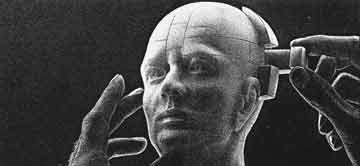In this issue:Homelessness and Psychiatric AbuseToxic Psychiatric Drugs: Interview with Robert WhitakerElectroshock Must Be BannedZyprexa: A Prescription for Disease & DeathThe Dangers of AntidepressantsMental Health Policy: Humane or Reactionary?Ghosts of the Albany LandfillBerkeley Haven for Homeless FamiliesFranciscans for Peace and JusticeTen Flaws of Social Security PrivatizationCAFTA and ColonizationSpirit of St. Mary's CenterLife Stories of Homeless SeniorsDisabled Bus Rider's HardshipsUnion Debates Sleeping Ban in Santa CruzARCHIVESJuly 2005June 2005May 2005April 2005March 2005February 2005Street Spirit is published by American Friends Service Committee. All works are copyrighted by the authors. The views expressed in Street Spirit are those of the individual authors alone, and not necessarily that of the American Friends Service Committee. |
|
Psychiatric Abuses and the Homeless Community
Editorial by Terry Messman

Homeless people often have to suffer through the most cruel and coercive forms of psychiatric abuse.
The issue of psychiatric abuses and forced psychiatric treatment is a matter of grave concern for poor and homeless people, and those who work with poor and disabled persons. This issue of Street Spirit takes an in-depth look at the issue of psychiatric abuses and atrocities.
The articles in this issue's special section on psychiatric practices add up to a damning indictment of pscyhiatric drugs and electroshock procedures which are perpetrated in the name of healing, yet often end up damaging and disabling people for life.
Whether on the streets or in the psychiatric wards, homeless people are discriminated against in ways that would not be tolerated by any other minority. Homeless people are subjected to ugly, yet nearly invisible forms of discrimination behind the closed doors of psychiatric hospitals.
Because the issue of psychiatric abuse is of burning concern to the homeless community, Street Spirit broke the story about the shocking mistreatment of low-income psychiatric patients at East Bay Hospital in Richmond in 1997. Our reporting helped close that horrible dungeon, and ever since, Street Spirit has continued to report on psychiatric injustices.
All too often, it is the grim fate of poor and homeless people to end up committed to the worst psychiatric hospitals, and to suffer the greatest neglect and abuse. Several factors conspire to create this outcome.
First, when people were deinstitutionalized from state mental hospitals (also known as snakepits), our society made a promise to set up community-based mental-health centers, supportive housing and therapy programs to enable them to live a life of dignity and independence in their own communities. All levels of government bailed out of that promise. The result of society's refusal to build a decent system of community mental health care is the abandonment of hundreds of thousands of people to a perilous existence on the streets, supported at best by a pitifully small SSI or GA check.
Second, the hardships, malnutrition, sleep deprivation and unbelievable stresses of street life can undermine the most stable person's mental state.
Third, poor people are sent to hospitals of last resort because they often have no medical insurance, no family to help and no stable residence. A homeless person who undergoes a psychological crisis on the city streets is a sitting duck to be picked up by the police and involuntarily committed to an inner-city psych ward. Society sets them up for this fall.
That is why the homeless movement must fight against psychiatric abuses and promote freedom and dignity and housing and decent health care for mental-health clients. The homeless movement and the psychiatric survivors movement are indissolubly linked -- linked by shared oppression, by discrimination, and by a common need for housing and health-care.
Our society's broken promises have left hundreds of thousands of disabled persons stranded on the streets. Just because we usually forget that disabled people have the same rights as the rest of us, it is still an act of pure bigotry to single out one class of fellow citizens for neglect, abuse and naked hostility.
STREET SPIRIT
1515 Webster St,#303
Oakland, CA 94612Phone: (510) 238-8080, ext. 303E-mail: Spirit
© 2002-2005 STREET SPIRIT. All rights reserved.
Published by American Friends Service Committee
Editor : Terry Messman
Web Design: Robert Mills, Web Weaver CyberB Solutions
